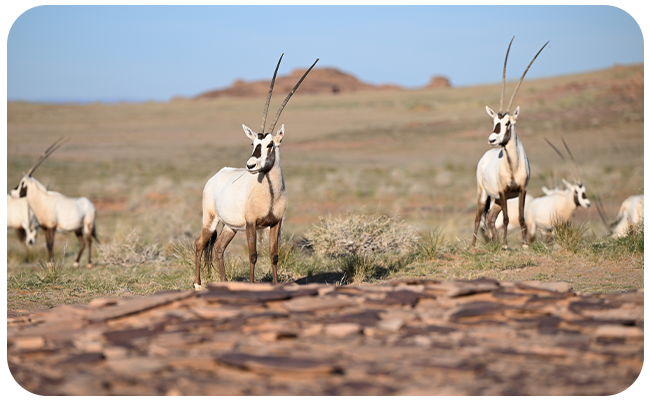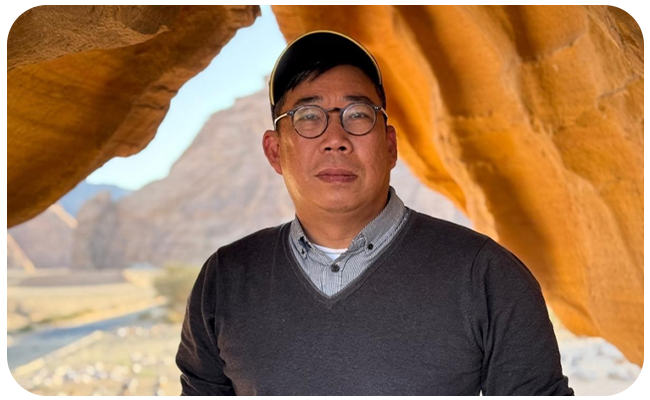In northwest Saudi Arabia, the Royal Commission for AlUla (RCU) is undertaking an expansive rewilding project to restore a degraded desert system from the ground up, ultimately aiming to reintroduce the arabian leopard.
From sandstone ranges and arid dunes to green oases and sheltered wadis, AlUla is home to an astonishing variety of landscapes and habitats. However, decades of overgrazing, hunting and lack of protection have led to biodiversity loss and the decline or disappearance of many species from the region.
We are working to restore nature’s balance by rebuilding the ecological pyramid and the food web connections between its layers. This began with the creation of the AlUla Protected Area Network – six reserves declared in 2019 covering 12,160 km2, each supported by a comprehensive management plan. Sharaan National Park, spanning 1,543 km2, achieved IUCN Green List status in 2024, placing it among the first 90 protected areas globally to meet the benchmark for effective and equitable governance.
At the base of the pyramid are the primary producers – plants. In partnership with IUCN ROWA, we developed a Strategy and Execution Plan for Ecosystem Restoration, founded a seed bank and nursery to collect and cultivate seeds from around 200 native species and launched a 100-hectare pilot site to test and improve planting practices. To date, we have planted over half a million seedlings in an active restoration site within Sharaan National Park, including key species like acacias that support wildlife and counter desertification. The removal of grazing pressure has resulted in a marked passive recovery of rangeland vegetation.
Next come the primary consumers - from invertebrates to ungulates. Smaller species are now thriving, and we have reintroduced four key threatened species that might not have repopulated AlUla on their own without intervention or only remained in fragmented populations: arabian oryx, arabian gazelle, sand gazelle and nubian ibex. Nearly 1500 have been released so far, with successful breeding recorded in recent months.

The increasing abundance of herbivores have supported predators such as the arabian wolf, reptile species and birds of prey. A recently discovered population of sooty falcons indicates that Sharaan National Park now hosts an estimated 5% of all breeding pairs of this Vulnerable bird of prey during their nesting season.
What lies ahead is the return of the Arabian Peninsula’s most iconic apex predator – the arabian leopard. Critically Endangered, with an estimated 120 remaining in the wild, RCU took charge of the national breeding project in 2019 with the ambitious aim of growing the population and preparing future generations for reintroduction - so that the arabian leopard can once again sit as the capstone atop AlUla’s fully restored ecological pyramid.
Successes so far include doubling numbers at the Arabian Leopard Conservation Breeding Centre and becoming the first Saudi member of The European Association of Zoos and Aquaria (EAZA). A state-of-the-art facility dedicated to preparing leopards for rewilding is set to be built this year. Meanwhile, global awareness is rising. In 2024, the United Nations declared February 10 as the International Day of the Arabian Leopard.
It is truly encouraging to see the alignment between our efforts here in AlUla and the themes of the 2025 IUCN World Conservation Congress - particularly in scaling up conservation action and the shift toward nature-positive economies. Among the many accepted motions, we are keen to support and share our experience in those relating to the IUCN Green List (Motion 012) and the conservation of threatened species in the Arabian Peninsula and Sahelo-Saharan regions (Motion 110). We also look forward to engaging with fellow thought leaders on motions addressing improved tree planting practices (Motion 001), sustainable management of rangelands and pastoralism (Motion 008), and the role of wild animals in ecosystems as a climate solution (Motion 039), both regionally and globally.
Author Biography:
Dr. Benjamin Lee is the Director of Research and Advisory for the Royal Commission for AlUla’s Wildlife and Natural Heritage Division. A zoologist by training with over two decades rising through the ranks of Singapore’s National Parks Board, he has a deep curiosity about the natural world. He leads a dedicated team engaged in research on desert biodiversity, wildlife management and geology.
